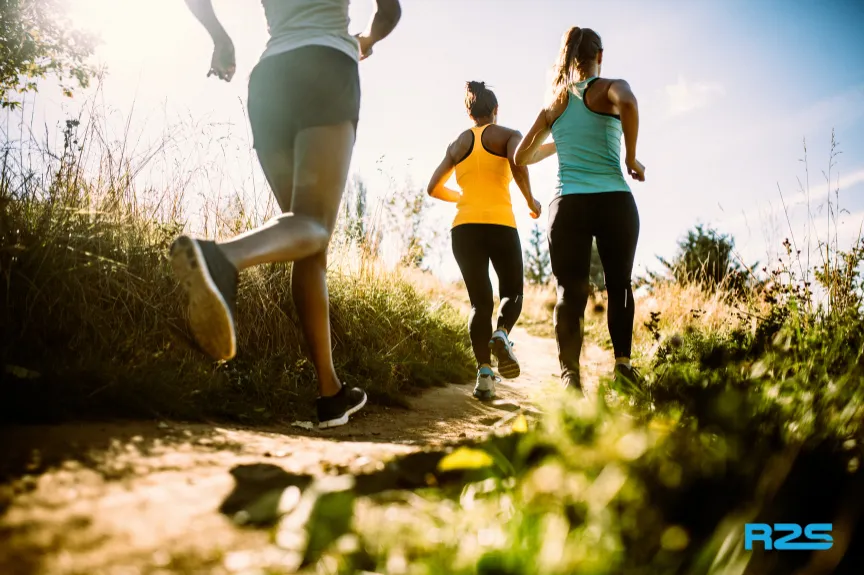BLOG
OUR BLOG
Welcome to the Return 2 Sport PT blog, where our goal is to keep you, THE ATHLETE, at your best. Here, we share insights and tips to improve your movement quality, alleviate pain and dysfunction, and equip you with the knowledge to maintain a pain-free and active lifestyle for the long haul.

Developing The Endurance Athlete Engine

Developing the Endurance Athlete Engine

People often ask questions like:
“What is the best exercise for runners?”
“What is the best exercise to make me faster?’
“Why do I keep getting injured over ad over again?”
The best answer for that is that there is simply no one thing that makes an athlete better, faster, or more injury resistant. There is a multitude of things that that can contribute to this.
As you know, running is mostly a straight line sport. Meaning, the upper body and lower body and doing the same repetitive task for however long you ask it to. As with any repetitive task, certain things will tend to wear down more if they are not resilient enough to withstand the load.
For example, when I was a homeowner for the first time I had a lot of tools that I needed to get to maintain my home and lawn. Buying all of these at once is pretty expensive, so what did I do? I bought cheaper tools that didn’t have the same quality as the more expensive ones. As you can probably expect, they broke and needed to be replaced because they were not crafted with the quality that was necessary to use them how I intended.
Running needs to be thought about with the same concept. The most important word to take away is the word quality. If you don’t create a high quality engine, how can you expect a high quality machine?
Most people know this deep down but still find a way out of understanding that this rule applies to them too. It is hard to see your own physical limitations prior to becoming injured sometimes as well.
Like vehicles, if you’re going to refrain from breaking down or blowing out a tire, you need to be very diligent about maintenance. Maintenance can come in many forms. To me, it comes in the form of strengthening, mobility, nutrition, hydration, sleep, mental health, and running form.
Without any one of the pillars of health, you may put yourself in a position for potential injury.
Strength: As I mentioned before, there is not one specific exercise that will make you a better runner. Most people would benefit from a thorough assessment by a physical therapist that specializes in running. This would help you find out what your strengths and weaknesses are how you could adjust your training plan. Another thing that runners don’t always like to hear is that you need to do something else besides running. Put yourself out there and do something different. Do something that will target those weaknesses. You will be amazed at how much this helps.
Mobility: Since running is a repetitive movement, overactive muscles tend to get very tight. This tightness can lead to poor form and can put the forces into different muscles and lead to a lot of inefficiency. The kinetic chain is meant to work together from the ground up when running, so if you have a mobility restriction at any point there is a much higher likelihood that you are creating a stress point somewhere along the way.
Nutrition: A lot of us fall into the category of “I run so that I can eat what I want.” While it is definitely true that you need to have more caloric intake to support the miles you’re running, you still need to think of your food as fuel. As it relates to running and nutrition, clean gas and oil makes cars run more efficient and and makes them less at risk for breaking down. Whole foods, avoiding soft drinks and excessive sugar are a great start. Fueling with food during runs over 2-3 hours may be necessary and becomes very important in the longer endurance events. Refueling after a hard run is equally important. It is recommended to ensure replinishment of glycogen and protein happen within an hour of your run to aid in the recovery progress so that your body can make muscular adaptations for gains in strength.
Hydration: If you can think of nutrition and food intake as the gas and oil, you can think of hydration as your engine coolant. Without the coolant, your engine would overheat, break down, and cause potential long term damage. Electrolytes are the regulators of our hydration system. Yes, water is important, but electrolytes are the single most important thing to an endurance athlete. If you only replace fluids with water as you run, you are missing out on the nutrients needed to allow your muscles to continue to function properly.
Sleep: Running is a highly demanding physical activity and can tax our body in a lot of different ways. I have a pretty normal sleep schedule and typically try to get around 8 or 9 hours of sleep most nights. Most days, I wake up with the alarm clock and get moving pretty easily. If I had a hard training session the day before, I find myself not wanting to get out of bed. Did I stay up later? No. Did I not get quality sleep? No. Or did my body just need more time to recover and rebuild? Bingo. The more we exert ourselves as runners and with other activities, we need to listen to our bodies as much as we can to allow proper healing and recovery. If you’re not getting the sleep your body needs, you’re going to be more at risk for injury, suffer from fatigue that doesn’t allow you perform during your workouts, and increase stress levels in your body that dampen performance across the board.
Mental health: A lot of times we use running as an outlet for our mental health and well being and it is probably one of the best things we can do. But what happens when we get injured or can’t run for some reason? This can have a huge negative impact on our mental health because the only outlet we had was this. If mental health is one of the main reasons why you love to run, you should have even more of a reason to focus on all of the pillars of health. If you are unfortunate enough to have an injury despite maintaining your endurance engine in tip to shape, use the new obstacle as a goal. Use the goal to get back to running, to run a certain distance again, or even come back stronger than before as motivation and the positive energy your body needs to make a comeback.
Running form: This is the single most overlooked part of running as it relates to injuries and optimal performance in my opinion. Not looking at running form is like a mechanic not asking you what’s going on with your car or driving prior to trying to diagnose what they need to fix. Beginner runners, intermediate runners, and season veterans can all have problems with running form that they are probably unaware of. Some people need to learn proper running form and it can help them avoid injuries in the future. Some people have good running form initially, but when they get tired the wheels start to fall off. Others may have had or are currently dealing with another injury or limitation that is causing them to make mechanical changes that will lead to a new injury. Having someone who specializes in running biomechanics take a look at your form every once in a while can be a very valuable tool to help you remain injury-free.
As a physical therapist who specializes in running and is an avid runner myself, I see the importance of each of these areas firsthand. If we, as athletes, want to be proactive and remain injury-free, I think it is very important that we dive into each of these categories and assess our overall “engine” and see if there is anything we could do better to optimize our performance. Since things like strength, mobility, and running form are a little tougher to assess with one’s self, my recommendation is to have a running specialist provide a comprehensive strength, mobility, and runnning analysis annually.
If you find yourself injured or not performing the way you would like to, then I recommend getting a formal evaluation by a Sports Physical Therapist that specializes in your sport, so that you can make the quickest and smartest recovery plan to return to running.
That's what we do here at Return 2 Sport. If you have more questions about anything running related or would like to take a deeper dive into any of the pillars of health as it relates to your sport, please feel free to contact me or book a discovery call with Return 2 Sport PT & Performance.
By: Dr. Dylan Glass, PT, DPT, SMTC
Return 2 Sport PT
256-513-9525
Book a time to chat with Dylan and his team to discuss the best plan to get you back to the activities you love.
We’re here to guide you every step of the way.
Book FREE 15-minute Phone Consultation HERE

Copyright (C) 2024 Return 2 Sport PT & Performance. All rights reserved.
Our mailing address is:
Return 2 Sport PT & Performance 2722 Carl T Jones Dr SE A2 Huntsville, AL 35802 USA

At Return 2 Sport PT & Performance, we specialize in performance-based physical therapy.
© 2024 Return 2 Sport PT & Performance All Rights Reserved |
Privacy Policy
